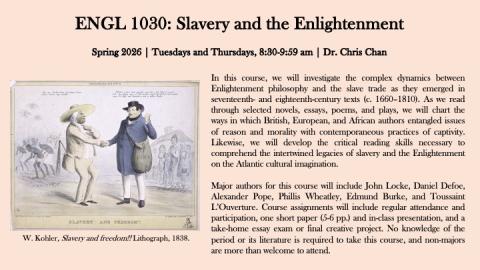In his seminal Second Treatise of Government (1690), the English philosopher John Locke reasoned that "Slavery is so vile and miserable an Estate of Man, and so directly opposite to the generous Temper and Courage of our Nation; that 'tis hardly to be conceived, that an Englishman, much less a Gentleman, should plead for't." Yet the fact remains that Britain, for all its "generous Temper and Courage," became the dominant player in the transatlantic slave trade, and that its involvement in the trade irreversibly transformed its economy and culture. That dominance likewise coincided with what historians now call the Enlightenment: a series of gradual but seismic advancements in political and moral philosophy (including notions of liberty) and the natural sciences.
In this course, we will investigate these complex dynamics as they emerged in literary and philosophical texts written across the seventeenth and eighteenth centuries (c. 1660-1810). As we read through novels, essays, poems, and plays, we will chart the ways in which various authors—Britons, Europeans, and enslaved Africans—entangled issues of reason and morality with contemporaneous practices of captivity. Likewise, we will develop the critical reading skills necessary to comprehend the intertwined legacies of slavery and the Enlightenment on the Atlantic cultural imagination.
Major authors for this course will include Locke, Daniel Defoe, Alexander Pope, Phillis Wheatley, Edmund Burke, and Toussaint L'Ouverture. Course assignments will include regular attendance and participation, one short paper (5-7 pp.) and in-class presentation, and a take-home essay exam or final creative project. No knowledge of the period or its literature is required to take this course, and non-majors are more than welcome to attend.
-
Theory & Cultural Studies Concentration (AETC)

 Department of English
Department of English
